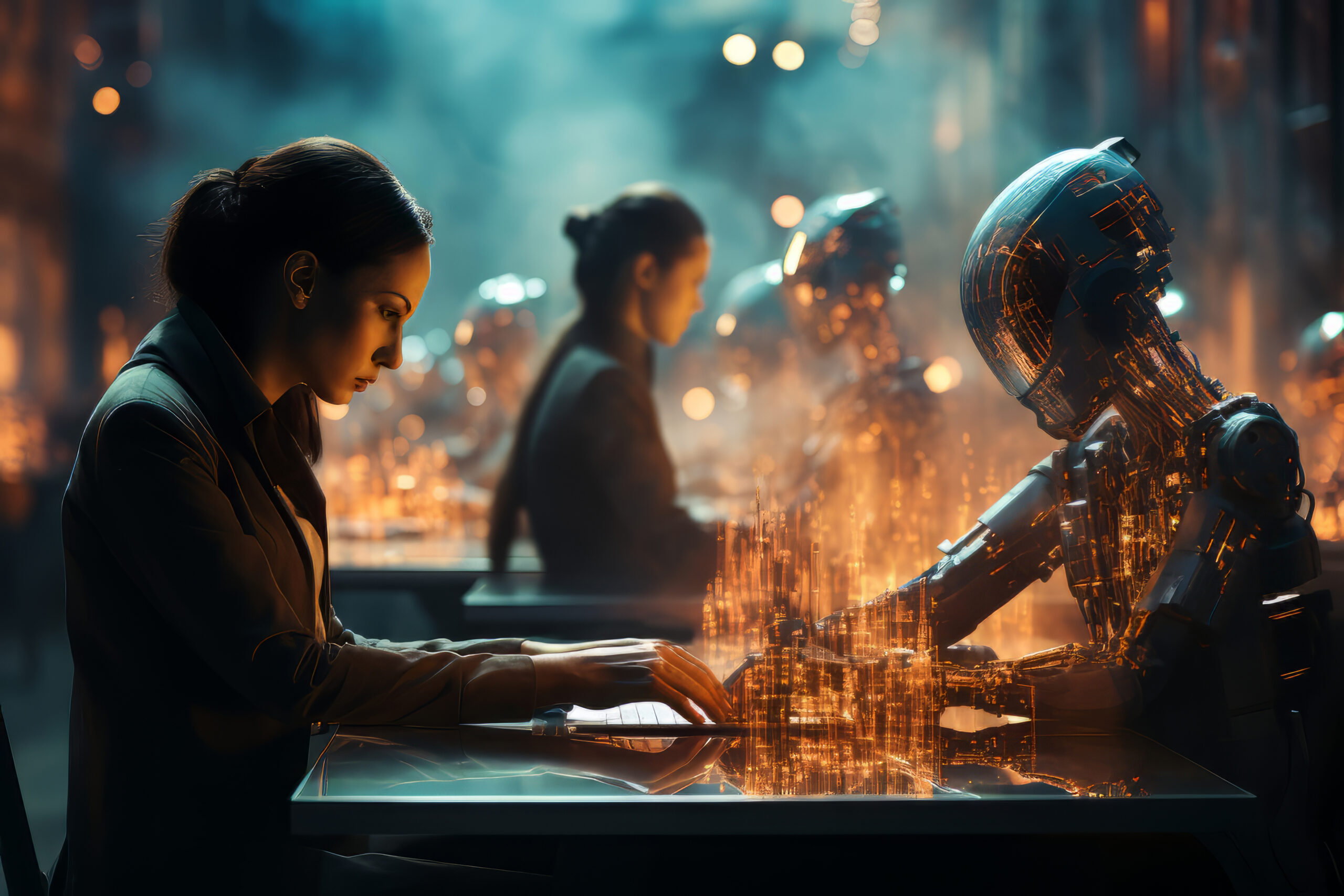Introduction
When you build something, it is very important that you build it with a set and predefined plan. In the construction industry, sticking to a construction plan is considered to be especially important. If the construction plan is not accurate or precise, it can lead to many losses ranging from safety to materialistic losses.
An accurate and precise construction plan helps to safeguard the construction site workers as well as finish the project on time within the specified budget. Therefore, ensuring that the construction plans made are accurate and precise became the top priority of all construction companies.
This is where the concept of AI in construction came in and transformed the entire construction industry. By using AI in construction industry, organizations are able to improve the accuracy and precision of their construction plans, leading to better efficiency and productivity.
In this blog, we will focus on understanding the ways in which AI is used in construction plans, the various methods of improving accuracy and precision in construction plans as well as the benefits of AI in construction.
How to Use AI in Construction Plans?
AI in construction is transforming the way companies plan and execute projects. It brings efficiency and accuracy by analyzing data, improving designs, and automating repetitive tasks.
Turning Raw Data into Actionable Insights
Construction projects produce large amounts of data, including records from previous projects, material details, and weather forecasts. AI in construction helps process this information into useful insights that make planning more accurate.
For example, AI tools analyze data from past projects to suggest better construction schedules. They consider factors like weather conditions and other potential delays. These insights allow teams to make smarter decisions, reducing risks and uncertainties. AI also identifies patterns, such as frequent delays or budget overspending, enabling teams to address these problems early and create dependable plans.
By organizing raw data and making sense of it, AI gives construction teams a clear understanding of potential challenges. This reduces the need for guesswork, leading to improved project outcomes. Projects stay on schedule and within budget as AI tools predict potential issues in advance. Additionally, real-time updates from AI allow teams to adjust quickly when unexpected problems occur, further enhancing the accuracy and efficiency of construction plans.
Improving Design Precision with AI Tools
The design phase of a construction project requires exceptional accuracy. AI in construction improves this process with tools that assist architects and engineers in creating highly detailed and error-free plans.
For example, AI design software can detect potential structural weaknesses in a blueprint before construction begins. It can also suggest alternative materials that might perform better or be more cost-effective.
Additionally, AI ensures compliance with building regulations and standards by cross-checking designs against legal requirements. This not only prevents costly rework but also ensures the project moves forward without unnecessary delays.
AI tools also provide 3D simulations, helping teams visualize the project in detail and identify any potential issues before they occur. By using AI to refine designs, construction teams achieve higher precision, saving both time and resources.
Automating Repetitive Planning Tasks
Construction planning involves many repetitive tasks, such as estimating costs, creating schedules, and calculating material needs. These tasks are important but often take a lot of time and can lead to errors. AI in construction helps automate these processes, making them faster and more accurate.
For example, AI tools can analyze project details to generate precise material estimates. This helps avoid ordering too much or too little, ensuring resources are used efficiently. Similarly, AI platforms can create detailed schedules, breaking down each phase of the project with precision. When it comes to budgeting, AI reviews past project data to provide more accurate cost forecasts, helping teams plan better.
By automating these tasks, project managers save valuable time and can focus more on important decisions instead of spending hours on repetitive activities. This efficient approach not only boosts productivity but also reduces the chances of mistakes that could cause delays or disrupt the project later. AI’s ability to streamline these tasks leads to smoother and more reliable construction planning.
Methods to Improve Accuracy and Precision of Construction Plans with AI
AI in construction is a game-changer for planning and execution. It helps foresee challenges, improve resource use, and ensure plans meet regulations, making projects more accurate and efficient.
Predicting Construction Challenges Before They Happen
AI in construction uses predictive analytics to identify potential problems before they occur. By analyzing data from past projects, weather patterns, and supply chains, AI can warn teams about possible delays or cost overruns.
For example, if there is a risk of bad weather or late material deliveries, AI tools provide alerts, allowing teams to adjust schedules or make contingency plans. These early warnings reduce disruptions and keep projects on track.
The ability of AI to forecast challenges helps construction teams be better prepared. This reduces last-minute issues and improves decision-making, ensuring that projects run smoothly and stay within budget. By addressing risks in advance, AI helps teams create more reliable and precise construction plans.
Mitigating Human Error with Advanced Simulations
Human errors are common in construction planning, but AI-powered simulations can help reduce them. These tools are able to create virtual models of all the construction plans, which allows teams to test designs before any type of physical work begins. For example, simulations can detect design flaws, such as weak structures or potential safety hazards, that might be overlooked in traditional planning.
These virtual tests provide valuable feedback, allowing teams to fine-tune their plans. If a particular design element is likely to fail under pressure or if a safety risk is identified, adjustments can be made early. This proactive approach helps prevent costly mistakes during construction.
By using AI simulations, teams can avoid rework, reduce delays, and improve safety. The ability to spot problems in advance leads to more accurate and reliable plans, saving time and money and ultimately ensuring the project runs smoothly and safely from start to finish.
Monitoring Compliance with Local Regulations
Ensuring that construction plans comply with local regulations is essential but can be time-consuming. AI in construction makes this process easier by automatically reviewing plans to check for compliance with zoning laws, building codes, and environmental rules. These tools can quickly highlight any issues, allowing teams to address them early in the planning stage.
For example, if a design includes features that exceed height restrictions or violate environmental guidelines, AI can alert the team immediately. This helps avoid fines or project delays caused by non-compliance.
By ensuring that construction plans align with legal requirements, AI helps keep projects on track and reduces the risk of encountering obstacles that could delay or complicate progress.
Optimizing Resource Allocation
Efficient use of resources is essential for any construction project. AI platforms help allocate resources more effectively by analyzing workforce skills, material availability, and equipment usage. For instance, AI can suggest the right number of workers needed for specific tasks or recommend alternative materials if there is a shortage.
By using AI, teams can ensure that no resources are wasted and that every element is used optimally. This helps to reduce the cost as well as improve the overall efficiency of the entire construction project. The insights provided by AI make it easier to manage large-scale projects where effective resource allocation is extremely important.
What are the Benefits of AI in Construction?
AI in construction provides numerous benefits, making the planning process more accurate and efficient. It improves every phase of construction, from reducing errors to enhancing safety and productivity. Some of the benefits of AI in construction are:
Fewer Mistakes, More Savings
One of the key advantages of AI in construction is its ability to detect potential issues early in the process. By identifying mistakes before they become major problems, AI helps avoid costly delays and expensive rework. This proactive approach not only saves valuable time but also ensures that construction projects remain within budget, resulting in significant cost savings for the company.
Accelerating the Planning Process
Planning in construction can take a lot of time, but AI tools help speed up this process. These tools handle repetitive tasks such as creating schedules and budgets, allowing teams to develop detailed plans much faster. Tasks that once took weeks can now be completed in a matter of hours, freeing up time for teams to focus on other critical aspects of the project.
Enabling Smarter Decision-Making
AI in construction helps teams make smarter decisions by providing real-time insights. By analyzing data from various sources, AI helps project leaders make well-informed choices regarding timelines, budgets, and designs. For example, AI can predict potential delays or offer suggestions for adjustments, leading to better decision-making and more successful project outcomes.
Improved Collaboration Across Teams
AI makes collaboration between different teams smoother by keeping all project data and updates in one place. With architects, engineers, and contractors able to access the same information, the risk of miscommunication is reduced. This shared access helps everyone stay aligned, making teamwork more efficient and cutting down on mistakes.
Elevating Safety Standards
AI also plays an extremely important role in improving the safety on construction sites. By predicting possible risks, AI can suggest measures to prevent accidents. For example, AI tools can identify hazards and check that safety protocols are being followed. This proactive approach not only keeps workers safe but also helps avoid incidents before they happen.
Conclusion
AI in construction has transformed the way projects are planned and executed. By improving the accuracy and precision of construction plans, it helps teams avoid costly mistakes, ensure safety, and meet deadlines.
With AI, construction companies can predict potential issues, automate repetitive tasks, and make better decisions with real-time data insights.
We at CrossML help construction companies use AI to improve project planning and execution by developing, deploying, implementing, and integrating AI solutions for construction into their business as per their specific and unique business needs.
FAQs
AI improves construction accuracy by analyzing project data, predicting potential issues, automating tasks like design and scheduling, and running simulations to identify design flaws early. This reduces human errors and improves overall precision throughout the construction process.
AI in construction estimation improves budget predictions by analyzing historical data, project requirements, and material costs. It adjusts for variables such as inflation and supply chain changes, offering more accurate cost forecasts and reducing the likelihood of budget overruns.
Yes, AI can assist in generating construction drawings by automating design processes, checking for structural integrity, and ensuring compliance with building codes. This allows engineers and architects to focus on creativity while minimizing the chances of mistakes in the drawings.
AI helps in creating building plans by analyzing project data and optimizing design elements. It automates tasks like site planning, material selection, and resource scheduling, ensuring the plan is accurate, efficient, and aligned with necessary safety and regulatory standards.



